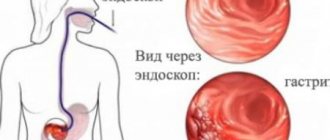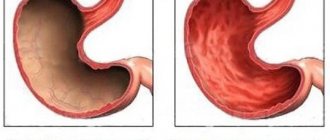Symptoms of stomach diseases
Abdominal pain is the main symptom of diseases of the digestive system.
Signs of gastrointestinal diseases include:
- epigastric pain;
- rare and frequent bowel movements;
- feeling of heaviness in the stomach;
- heartburn;
- nausea;
- increased separation of gases;
- lack of appetite.
Depending on the reason for the stomach pain, the unpleasant odor changes:
- putrefactive – enteritis, colitis;
- sour – gastritis;
- rotten - pancreatitis;
- bitter – biliary dyskinesia.
The appearance of bad breath is a serious symptom that should not be ignored. If your mouth stinks on an empty stomach, the probability of having a gastric disease is close to 100%.
Diseases of the gastrointestinal tract
Stomach ailments cause a lot of inconvenience to a person, but with timely diagnosis and the correct treatment regimen, they can be successfully eliminated.
Let's look at the most common diseases in the gastrointestinal tract and their symptoms.
Enteritis
A disease of the small intestine characterized by swelling of the mucous membrane and impaired absorption of food.
Causes:
- intestinal parasites;
- poisoning;
- poor nutrition;
- uncontrolled use of antibiotics;
- problems with enzyme production.
Clinical picture of enteritis: sudden weight loss, lack of appetite, diarrhea, decreased general tone.
Colitis
The digestive process is completed in the large intestine.
Inflammation affecting the mucous membrane of the colon.
Main manifestations:
- bloating and rumbling stomach;
- cutting pain;
- increased gas evolution;
- the urge to defecate, causing pain;
- diarrhea.
Colitis results from:
- intestinal infections;
- imbalance of microflora;
- poor nutrition;
- parasitic infestation.
Colitis can occur in acute or chronic form.
Gastritis
The most common pathology causing bad breath is gastritis, in which inflammatory lesions of the gastric mucosa are observed.
Provoking factors:
- bacteria;
- lack of proper nutrition;
- stress, depression;
- parasites;
- long-term use of antibiotics.
Symptoms:
- burning in the epigastric area;
- pain after eating;
- belching;
- feeling of heaviness;
- flatulence.
Gastritis is distinguished by increased or decreased gastric secretion, but patients may not have any complaints other than the smell from the mouth.
Pancreatitis
In an adult, the length of the pancreas is 15-23 cm.
A disease of the pancreas, characterized by degenerative processes, a violation of the outflow of produced enzymes, which causes self-digestion.
The process is accompanied by:
- cyanosis of the skin;
- hiccups;
- pain in the epigastric region and left hypochondrium;
- flatulence;
- defecation disorder;
- nausea, vomiting.
Causes of pancreatitis:
- alcoholism;
- abuse of fatty foods;
- cholelithiasis;
- injuries and congenital defects of the pancreas;
- parasitic and viral infections.
Complete destruction of the pancreas is fatal.
Biliary dyskinesia
Violation of the activity of the gallbladder is characterized by stagnation of bile and changes in its composition.
Symptoms of malfunction of the bile ducts:
- a feeling of bitterness in the mouth;
- pain at the point of the gallbladder and right hypochondrium;
- nausea;
- eruption of gastric contents;
- dark-colored stool and urine;
- lack of appetite.
Reasons for development:
- pancreatitis;
- gastritis;
- stomach ulcer;
- stress, neurosis;
- hypothyroidism;
- intestinal parasites;
- genetic predisposition;
- viral hepatitis.
Due to stagnation of bile, stones can form in the bile ducts.
Video: Diseases of the digestive system as a cause of bad breath.
How to determine the presence of gastritis?
The simplest diagnostic method is to check your tongue for plaque. With any dysfunction of internal organs, a coating forms on the tongue. For example, if there are problems with the liver, it turns yellow.
Similar symptoms occur in diseases of the pancreas and gall bladder. For a more detailed examination, you need to consult a gastroenterologist.
Diagnosis of diseases
If you experience frequent symptoms of bad breath, you need to go to a medical hospital for a diagnosis.
At the discretion of the doctor, the following examinations may be prescribed:
- Gastroscopy.
- Biochemical tests.
- Ultrasound of internal organs.
- X-ray examination.
- Diagnostic puncture.
- Laboratory tests of blood, urine, feces.
- Determination of stomach acidity.
After an examination and history taking, the gastroenterologist will determine whether the stomach smells bad or whether consultation with another specialist is required.
Laboratory and diagnostic tests
When contacting a specialist, he may prescribe a number of laboratory and diagnostic tests:
- mandatory blood and urine tests;
- blood chemistry;
- FGS of the stomach;
- in rare cases, a biopsy of the gastric mucosa is required;
- Ultrasound;
- lithotripsy, which is a procedure to remove stones due to improper functioning of the biliary tract.
However, you should not think that tests and procedures are useless. They are very unpleasant, but will help avoid such serious problems as gastrointestinal cancer and ulcers.
How to get rid of bad breath due to stomach
For an adult suffering from stomach ailments and bad breath, regardless of the cause, a comprehensive treatment will be developed.
- medicinal;
- dietary;
- physiotherapy.
As a supplement to the main treatment, the use of folk recipes is allowed.
Dietary recommendations
Kefir is recommended for gastritis with low acidity.
The appearance of a stench even on an empty stomach confirms the presence of a malfunction in the digestive tract.
A balanced diet will help restore microflora:
- Exclusion from the diet of fried, salty, fatty foods.
- Reducing the amount of carbohydrates and sugar.
- Refusal of fruits and vegetables that stimulate bloating and fermentation (sour apples, grapes, plums, cabbage, corn, peas).
- Drinking enough clean water (1.5-2 liters per day).
- Introducing into the diet a large amount of fermented milk products rich in bifidobacteria (yogurt, kefir).
It is impossible to completely get rid of bad breath through diet.
Folk remedies
It will not be possible to get rid of stomach disease using traditional medicine recipes alone, but this option is suitable as an addition to drug treatment.
So, if the cause of bad breath is problems with the digestive system, you can use a saline solution. To prepare, dissolve a tablespoon of salt in 0.5 liters of boiled water. Drink a glass of the solution, and after half an hour - a glass of kefir or natural yogurt. The procedure must be repeated for five days. Attention! This method should not be used if you have gastritis or ulcers. Otherwise, the situation may worsen.
To freshen your breath for a long time, you can use the following folk recipes:
- Mint decoction. You will need 10-12 fresh mint leaves. Pour boiling water over them and leave for thirty minutes. Then filter the broth. You can rinse your mouth with the resulting mint water every two to three hours.
- Decoction of oak bark. Pour a tablespoon of dry oak bark with a glass of boiling water. Place the mixture in a water bath and cook for half an hour. Then strain the broth and rinse your mouth every three to four hours.
- Chew a few clove seeds. Your breath will be fresh for several hours. Moreover, this method will get rid of germs in your mouth.
- Chew a few basil leaves. The taste, of course, will remain specific, but the bad breath will disappear for several hours.
- Chew a few coffee beans. This method will especially appeal to coffee lovers, because in addition to getting rid of bad breath, you will also get a boost of energy.
How to treat stomach bad breath?
Listed below are several techniques that will help get rid of bad breath due to gastrointestinal problems. For maximum effect, use all types of influence at the same time.
Medications
Depending on the diagnosis, tablets and suspensions are designed to eliminate the problem:
- enteritis - Imodium, Erythromycin, Lactobacterin, Espumisan;
- colitis - “No-shpa”, “Furazolidone”, “Smecta”, “Linex”, “Enterol”;
- gastritis - “Renny”, “Gastal”, “Vicalin”, “Motilium”, “Mezim”, “Festal”;
- pancreatitis - “Atropine”, “Pancreatin”, “Fluorouracil”, “Dalargin”;
- biliary dyskinesia – “Domperidone”, “Allohol”, “Berberine”, “Odeston”, “Buscopan”.
Drug therapy is prescribed by the attending physician after determining the disease. Be sure to make an appointment with a gastroenterologist at your local clinic.
Traditional methods
To get rid of bad breath, use folk remedies:
- rinsing with decoctions of medicinal herbs (rosemary, chamomile, calamus root, periwinkle);
- herbal teas (melissa, mint, St. John's wort);
- eating aromatic seasonings (anise, parsley, basil).
Halitosis and its varieties
The disease is usually divided into three subtypes:
- True. It manifests itself as a really strong unpleasant aroma from the mouth and does not go away even after thorough brushing of teeth, treatment and following a proper diet. True halitosis is long-lasting and may even be accompanied by belching and severe gastrointestinal problems.
- Pseudohalitosis. It manifests itself as a barely perceptible odor, but it can be inconsistent. In most cases, it is associated with non-compliance with the diet and proper brushing of teeth, as well as an unbalanced diet.
- Halitophobia. The patient invents a problem for himself and does not want to put up with the idea that he does not have any disease. In this case, psychological help may be needed.
Most often, an unpleasant odor occurs after a night's sleep and can appear along with a strong plaque on the teeth and tongue. Sometimes halitosis manifests itself against the background of hunger.
The unpleasant smell due to stomach problems can be different, it depends on the degree of the disease itself.
Putrid smell
It is also often referred to as a “rotten egg” smell. This is a symptom of such a serious and chronic disease as stenosis. Here are the reasons for this condition:
- Motility is impaired and normal tone of the gastrointestinal tract is absent.
- There is an inability of the stomach tissues to properly and completely break down the incoming food due to weak muscles. It lingers in the stomach and is not pushed into the intestines.
- The internal glands of the stomach do not work well. The secretion of special enzymes and electrolytes is disrupted. This condition is characterized by low stomach acidity and insufficient production of gastric juice.
In such cases, a feeling of heaviness, bloating, discomfort and pain in the abdominal cavity are typical.
Sour smell
It appears when, on the contrary, a lot of gastric juice is released and acidity increases. As a result, the inner lining of the stomach is corroded by hydrochloric acid.
One of the symptoms is the occurrence of hiccups and belching, thus causing the release of air from the stomach into the esophagus. These are the main reasons for such a specific smell.











